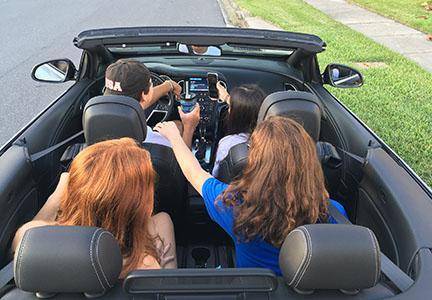Identify three common risks for young drivers pictured above?
Get a Free Consultation
A. Identify three common risks for young drivers pictured above
- Risky Driving – The driver has only one hand on the wheel
- Distracted Driving – The driver is looking at a cell phone
- Teenage Passengers – The passenger in the back seat is seated improperly and the passenger in the front seat is distracting the driver
B. What safe skills can be used to reduce each of those risks?
Risky driving safe skills
- The driver should have both hands on the wheel and their eyes on the road.
- Practice defensive driving skills like adjusting your speed to road conditions and using your turn signal every time you drive.
- Be considerate of others on the road. Drive safely for their sake and your own.
Driving with teen passengers safe skills
- Passengers should be seated properly to avoid distracting the driver.
- Check that your friends are wearing their seatbelts and that they understand not to distract you while you’re driving.
- Ask someone you trust to sit in the front seat and help with directions, so you can focus on your drive.
Distracted driving safe skills
- Focus only on driving when you are behind the wheel.
- Put your phone on Do Not Disturb (DND) or Driving Mode.
- Use a dock to attach your phone to the dashboard if you’re using the GPS.
- Store your phone in the glove compartment if you can’t resist using it.
Other Safe Skills for Young Drivers
Inexperienced driving safe skills
- Practice defensive driving habits with an adult or driving instructor in the car as much as possible.
- Assess your fitness to drive before you get in the car. This means your mental, physical and emotional well-being, including whether you’ve had enough sleep. This is so important, we’ve devoted an entire module to it in this course!
Impaired driving safe skills
- Always drive sober.
- If you or your friends decide to drink or use other substances, get a ride from someone so you all get home safely.
- Don’t drive when you’re tired, sick, or in a bad emotional state. Your driving skills can be impaired by tiredness and emotions just as much as by being intoxicated.
Driving at night safe skills
- Use your headlights.
- Drive more slowly at night.
- Give yourself more space between your car and the car ahead of you, especially in inclement weather or other hazardous conditions.
- Adjust your rearview mirror for night use.
- Don’t use your high beams within 300 ft of a vehicle ahead of you going the same direction, or within 500 ft of an oncoming vehicle.
- Always wear glasses or contact lenses if you need to. Keep a backup pair of glasses and lens solution in the car.